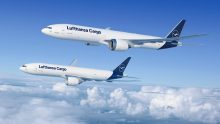 Boeing, one of the world’s biggest aviation companies, has projected that air cargo traffic will double in the next two decades as the industry shifts its focus to evolving demand following the coronavirus pandemic. The expansion will be supported by a 57 per cent growth in the global freighter fleet, which would put it at 3,600 aircraft, and will require about 2,800 new and converted freighters for growth and replacement until 2041, the Virginia-based company said in its World Air Cargo Forecast. A third of deliveries will be new jets, while the remainder will come from conversions, giving carriers the ability to increase their flexibility in existing and emerging markets, it said. “While the air cargo market is returning to a more normal pace after historic demand in the last two years, structural factors including express network growth, evolving supply chain strategies and new cargo-market entrants are driving sustained freighter demand,” said Darren Hulst, Boeing’s vice president of commercial marketing. “In the global transportation network, air freighters will continue to be a critical enabler to move high-value goods, in increased volume across expanding markets.” Air cargo was a rare bright spot for airlines during the travel-starved years of the pandemic, prompting many to convert older passenger jets to freighters and to invest in new cargo planes. Strong e-commerce demand and the slower return of passenger flights with cargo belly capacity drove airlines to snap up freighters during the pandemic, said reports.
Boeing, one of the world’s biggest aviation companies, has projected that air cargo traffic will double in the next two decades as the industry shifts its focus to evolving demand following the coronavirus pandemic. The expansion will be supported by a 57 per cent growth in the global freighter fleet, which would put it at 3,600 aircraft, and will require about 2,800 new and converted freighters for growth and replacement until 2041, the Virginia-based company said in its World Air Cargo Forecast. A third of deliveries will be new jets, while the remainder will come from conversions, giving carriers the ability to increase their flexibility in existing and emerging markets, it said. “While the air cargo market is returning to a more normal pace after historic demand in the last two years, structural factors including express network growth, evolving supply chain strategies and new cargo-market entrants are driving sustained freighter demand,” said Darren Hulst, Boeing’s vice president of commercial marketing. “In the global transportation network, air freighters will continue to be a critical enabler to move high-value goods, in increased volume across expanding markets.” Air cargo was a rare bright spot for airlines during the travel-starved years of the pandemic, prompting many to convert older passenger jets to freighters and to invest in new cargo planes. Strong e-commerce demand and the slower return of passenger flights with cargo belly capacity drove airlines to snap up freighters during the pandemic, said reports.
Breaking News
- ‘Freighter shortage becomes a critical industry challenge’
- ‘India needs freighters to power Its export surge’
- ‘India needs modern freighters to meet 2030 cargo ambition’
- ‘Belly capacity limits air cargo potential of India’
- ‘Lack of freighters slows down international air cargo growth’
- ‘Belly capacity can’t meet India’s rising cargo demand’
- Amazon announces US$35 bn investment to boost logistics ops
- DP World unveils EXIM rail service from MP to Nhava Sheva
- TVS ILP signs pact to build MMLP in Telangana
- IICS 2025 kickstarts in Mumbai, fosters growth & innovation
- Hans Infomatic unveils WiseTrax to boost cargo efficiency
 Cargo Breaking News
Cargo Breaking News


